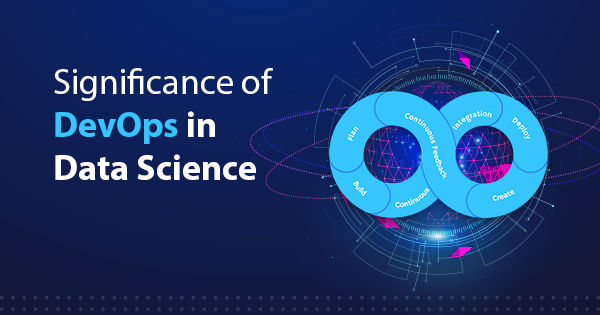When we talk about machine learning and data science, we generally associate these two terms with statistics, algorithms, mathematics, data wrangling, and more. Well, these tasks are very core to the successful implementation of machine learning in business. However, there is one important function that is getting popular, i.e. DevOps for data science which initiates the discussion on significance of DevOps in Data Science.
But why DevOps matter and why the term is getting popular in the cloud industry? Well, in this article, we will discuss all these things in detail. We will also talk about the significance of DevOps in data science. Before moving into the detailed discussion, let’s know about DevOps.
Also Check: List of top DevOps tools
What do you mean by DevOps?
In general, DevOps are the experts who assist the developers or data scientists and Information Technology work together. There is a great significance of DevOps. Developers work under their chain of command, or you can say, project managers. They always want to obtain all the features for the products as soon as possible. For data scientists, this means altering all the structure and variables of the model. Now, the other end is IT. Talking about the IT experts, they make sure that all the networks, firewalls, and servers are functioning correctly.
Furthermore, they also deal with cybersecurity. Here you might be thinking why DevOps matters in this field? The answer is quite simple. They work as a middleman between IT and developers. Some of the major functionalities of DevOps include testing, packaging, integration, and deployment.
Here’s a quick DevOps introduction to learn the basics of DevOps
The Ecosystem of DevOps
We all know that DevOps functions on trust between automated and productive processes. There is a growing demand for someone who matches the operation as well as developer profile in the IT industry. This proves that the need for DevOps will increase in the coming time. In the IT industry, DevOps is termed as a cultural approach. Integrating DevOps in software development and data science has many benefits. We will discuss this later.
Understanding the Importance of DevOps
As discussed above, DevOps is nothing more than some sets of processes that coordinate to combine the development teams and software development processes effectively. Why DevOps is popular? Well, the reason behind the massive popularity of DevOps is that DevOps lets the businesses to develop and improve products at a faster rate than the traditional methods. Now, let’s talk about the importance of DevOps.
1. Reduced development cycle and repaid innovation
When you get some biased responses from operation and development teams, it will be quite confusing to tell it that a particular application is functional or not. When developers submit a request, this extends the cycle times. But with the help of DevOps, such issues can be prevented. DevOps ensure the maximum level of smoothness in the process. This a major significance of DevOps.
2. Dramatically reduces the recovery time and chances of failure
The primary reason behind the failure of the teams is programming defects. With a limited development cycle, DevOps promotes regular code versions. This makes it quite simple to identify the defective codes. With this, the team can utilize their time to lower the chances of implementation failure using robust programming principles. Recovery time matters the most while working on a project.
3. Better cooperation and effective communication
It has been observed that DevOps helps in better cultural development. In an organization, culture doesn’t focus on personal goals; it focuses on overall performance. When there is a maximum level of trust in a team, all the team members can experience and develop quite effectively.
The team can work best to bring the products to the market faster. DevOps makes the entire process transparent, and this, in turn, motivates the staff to work for a common goal. That’s why there is a need for DevOps in every organization that deals with cloud services.
4. Higher Competencies
When there is a higher level of efficiency, it becomes quite easy to accelerate development worlds. There are different ways to automate various DevOps tasks effectively. For example, the continuous integration server automates the process of code testing and reduces the level of manual work. That means software developers can only focus on such tasks that are impossible to automate.
Speeding up equipment is the best way to boost efficiency. For instance, a cloud-based platform can boost the developer’s access to hardware. This, in turn, accelerates the testing and deployment process. That’s why DevOps is popular
5. Lowers the cost and information technology staffs
Another great significance of DevOps is that it reduces the need for IT staffs in an organization and lower the general cost. DevOps team requires IT staff to be 35% less, and IT costs to be 30 % lower.
DevOps helps in making the QA and automation processes deployment faster and more frequent. With these companies get alternative ways for planning and reviewing in a better way. That helps in lowering the pressure without affecting the process. So, these are some of the importance of DevOps for an organization. Now let’s move to the real topic.
Kubernetes is the most popular container orchestration solution with DevOps. Let’s understand how Kubernetes and DevOps toegther make a perfect match!
Increasing implementation of DevOps in data science
In general, data scientists develop data models which require to run in a production platform. Most of the DevOps practices are focused on production-based data science applications. But such methods are generally noticed but disregarded in the data science training.
Many companies don’t want to invest in the platform of data science. While some other companies have a small team to deal with basic operations, in such cases, the companies should know the real significance of DevOps and apply DevOps practices to data science. Well, with a few tunings and understanding DevOps tutorial, DevOps practices can be applied to the data science workflow.
DevOps includes configuration management, infrastructure provisioning, deployment, rapid integration, project monitoring, and more. The DevOps team always closely works with the developers to efficiently manage the lifecycle of the applications.
Also Read: Quick List of DevOps Best Practices
Implementing DevOps into Data Science
Data science teams add some extra responsibilities to DevOps. On the other side, data engineering demand a perfect collaboration of data scientists with DevOps teams. Furthermore, the operators are also expected to provide the clusters of Apache Airflow, Apache Hadoop, Apache Spark, Apache Kafka, and more to effectively address data transformation and extractions.
Then, the data scientists examine the transformed data to study the insights as well as correlations. They use a lot of tools to visualize data — for example, Tableau, Jupyter Notebooks, Power BI, Tableau, and more. Deep learning and machine learning require huge infrastructure having powerful GPUs and CPUs.
Different frameworks, like Apache MXNet, TensorFlow, Caffe, and CNTK, force GPUs to run at the maximum level for complex computation. So, the DevOps experts will support data scientists by developing a perfect environment for data visualization and explorations. They can also offer a DevOps tutorial to help them learning. This is the another major significance of DevOps.
The increasing demand of DevOps professionals makes candidates choose DevOps career. Here are the 10 things to know before starting DevOps career.
Start with Providing Assistance to Data Scientists
1. Just like application developers, data scientists are also involved in solving different issues, configuring their tools, and they don’t put much effort into infrastructure configuration. However, they may not have that level of experience that a software developer has to set up the development workflow. This lets the DevOps experts consist of data scientists as their customers and help them to detect the requirement and take ownership in providing the required solutions.
2. Here you can consider one more significance of DevOps. The DevOps experts help to choose and standardizing the development environment. Such a task can be carried out traditionally or using a virtualized desktop. While working with the data scientists, DevOps engineers imitate the configurations and applications to the deployment ecosystem. Then they need to review where the data scientists keep their codes, the process of coding, and the process of implementation.
3. It has been observed that most of the data scientists don’t know about version control tools like BitBucket, GitLab, and GitHub. Maybe they are using some code repository but don’t know how to automate the integrations. So, continuous integration deployment is another task for DevOps experts to help the data scientists. This creates standards and also authorizes some manual works in new algorithms testing.
4. Furthermore, developing models of machine learning is quite different from the traditional application development process. With the presence of a fully-trained machine learning model, DevOps teams can host the model in a scalable environment. They can also take advantage of various orchestration engines, such as Kubernetes and Apache Mesos, to scale the implementation of the models. So, this can be another crucial significance of DevOps.
Bottom Line
The emergence of containers and container management tools has made ML development quite efficient. DevOps experts are now leveraging the containers for provisioning data processing pipelines, development environments, and more. Advanced technologies such as MlFlow and Kubeflow have helped DevOps engineers to deal with new challenges related to ML infrastructure effectively.
There is no doubt that data science and machine learning bring a whole new dimension to DevOps. However, when it comes to enjoying the maximum benefits of the ML paradigm, both developers and operators will have to work together with data scientists as well as data engineers.
Are you preparing for any DevOps certification? Enroll now for DevOps certifications training courses and get ahead to have a bright career as a DevOps professional!
- Top 10 Highest Paying Cloud Certifications in 2024 - March 1, 2023
- 12 AWS Certifications – Which One Should I Choose? - February 22, 2023
- 11 Kubernetes Security Best Practices you should follow in 2024 - May 30, 2022
- How to run Kubernetes on AWS – A detailed Guide! - May 30, 2022
- Free questions on CompTIA Network+ (N10-008) Certification Exam - April 13, 2022
- 30 Free Questions on Microsoft Azure AI Fundamentals (AI-900) - March 25, 2022
- How to Integrate Jenkins with GitHub? - March 22, 2022
- How to Create CI/CD Pipeline Inside Jenkins ? - March 22, 2022




